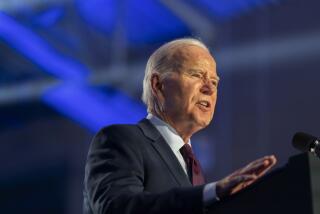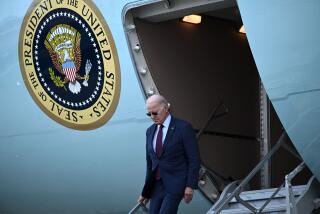Gingrich wins endorsement from supply-sider Art Laffer
It’s an intriguing argument for a futurist like Newt Gingrich: Vote for me and bring back the past.
Gingrich, who has claimed he is the only Republican presidential candidate who can fix the economy because he has already done so twice before—once with Ronald Reagan in the 1980s and again as speaker of the House in the 1990s—trotted out one of the architects of “Reaganomics” at a campaign stop Thursday.
Economist Arthur Laffer, the 71-year-old father of supply-side economics, endorsed Gingrich here in this picturesque lakeside town in northwest Iowa, where Sarah Palin ran a half-marathon last August.
“I think if Newt is president, you are going to see economic growth beyond what you have ever seen,” said Laffer, who introduced Gingrich to a crowd of about 100 here in Storm Lake.
“Newt really delivered,” said Laffer, “When he was speaker, he was able to work with Bill Clinton closely and carefully to bring one of the most prosperous periods in American history.”
Laffer, whose theory is also called “trickle down” -- or “voodoo economics,” a derogatory term coined by George H.W. Bush when he vied with Reagan for the GOP nomination -- posits that cutting taxes and regulations stimulates the economy, adds jobs and is more effective at raising revenue than simply raising taxes.
(Those paying attention in the 1980s might recall his “Laffer curve,” an upside-down U that shows a theoretical, optimal tax rate for maximum revenue generation. A government that taxes too little won’t generate enough revenue, the Laffer curve posits, but a government that taxes too much won’t either, because there will be no incentive to earn a lot of money.)
Critics often say that those who lionize Reagan conveniently forget that while Reagan cut taxes in his first term, he later raised taxes many times to help balance the federal budget.
Gingrich has been trying to emulate another aspect of Reagan, a former actor who was meticulous about what the consultants now call the “optics” of campaigning.
On Thursday for the first time, a group of everyday Iowans sat behind him as Gingrich spoke to a crowd of about 100 in a meeting room at King’s Pointe Waterpark. Gingrich’s wife, Callista, stood onstage to his left as she always does, hands clasped, the swoosh of her perfect platinum bob visible to the audience. She looked at him attentively, evoking for those who recall it the famous Nancy Reagan gaze. (And also perhaps to ward off unwanted questions about his troubled marital past, a sticking point for some evangelical Christians here.)
Joanne Samsel, a retired teacher standing behind the couple onstage, complimented Callista Gingrich.
“She’s elegant, she’s beautiful, she’s everything that we could ever want for the United States,” said Samsel. “So Jackie Kennedy: Enjoy the time that you had, but we have ours coming up.”
Callista took her husband’s microphone: “I appreciate that very, very much,” she said.
Earlier in an impromptu conversation with reporters at his Sioux City headquarters, Gingrich said he is not worried about his plunge in some polls. Others, he noted, have him in second place, behind former Massachusetts Gov. Mitt Romney.
”Let me just say I think that the strategy of focusing on jobs and economic growth and staying positive… is working,” said Gingrich, who has also been holding daily 30-minute telephone town halls with Iowa voters to counteract the deluge of negative ads by his opponents. So far, he said, he has spoken to more than 30,000 people, though the number is not verifiable.
During the calls, he invites callers to ask any question they wish, sometimes with unanticipated results. Last night, a man accused him of being a polygamist for having three consecutive marriages. Gingrich, who converted to Catholicism before marrying his wife, Callista, replied that he could not be a polygamist since his previous two marriages were annulled. He thanked the man for his “creative question.”
Town halls can be unpredictable, too. Samsel, who had complimented Callista Gingrich, asked the candidate whether it was true that Arizona would not allow President Obama’s name to appear on ballots because he is “not a citizen.”
“I thought you were going to ask whether Donald Trump is a citizen,” he joked before declaring the question “moot.” “There is every reason to believe he is a citizen of the United States. He is a terrible president, we don’t have to go beyond that.”
More to Read
Get the L.A. Times Politics newsletter
Deeply reported insights into legislation, politics and policy from Sacramento, Washington and beyond. In your inbox three times per week.
You may occasionally receive promotional content from the Los Angeles Times.







